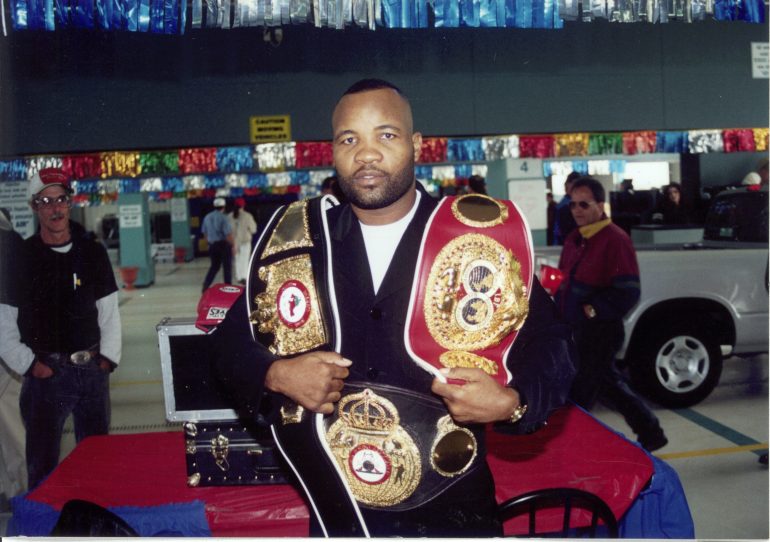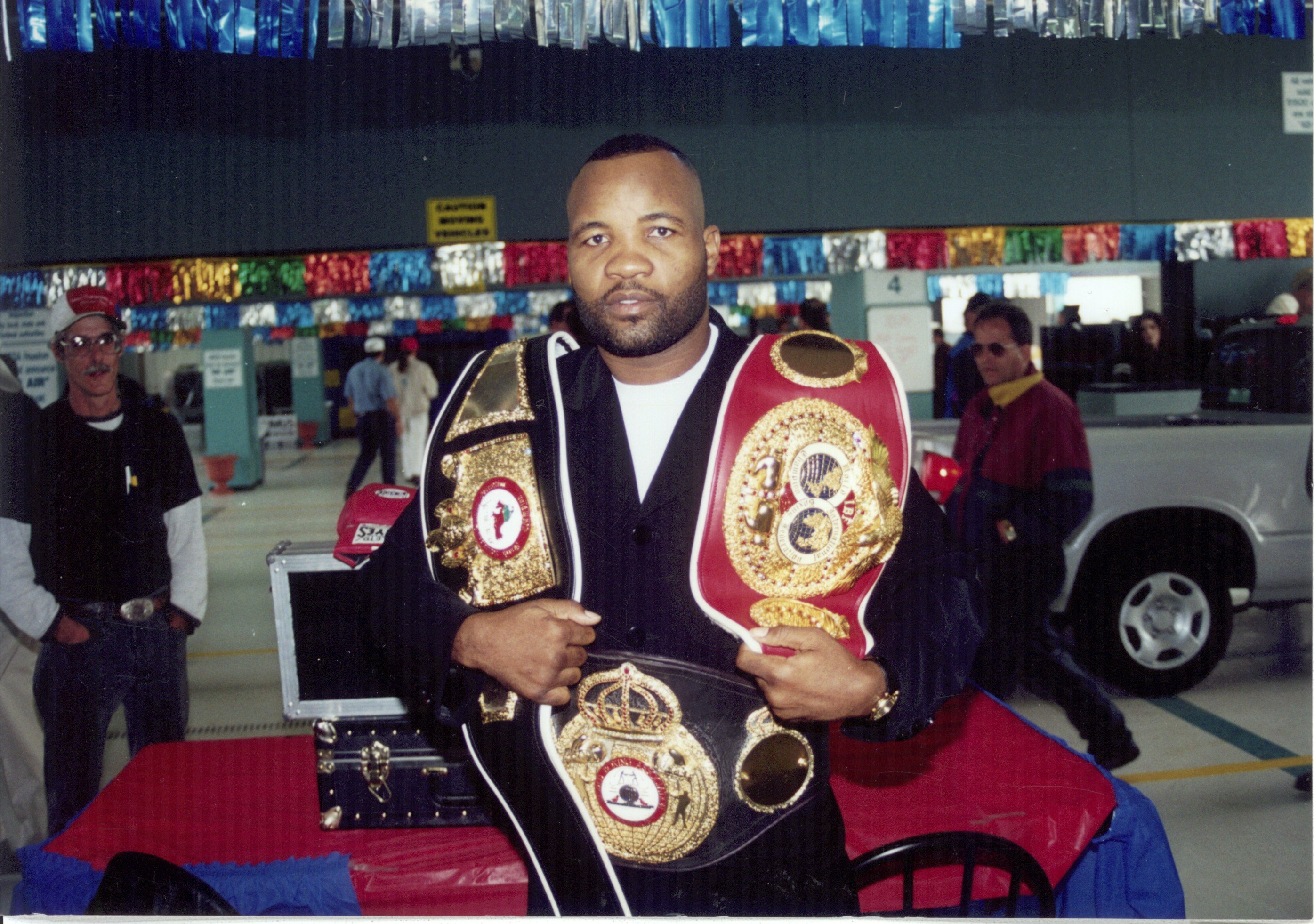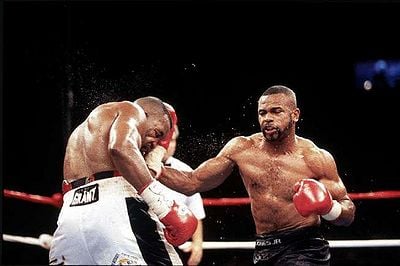Best I’ve faced: Reggie Johnson


Photo courtesy of Reggie Johnson
Throughout history only eight men have won world titles at middleweight and then stepped up to light heavyweight and repeated the feat.
Five of them are in the Hall of Fame: Bob Fitzsimmons, Dick Tiger, Sugar Ray Leonard, Thomas Hearns and Mike McCallum. Two others, Roy Jones Jr. and Bernard Hopkins, are first ballot entries once they retire. The last member of the exclusive club, Reggie Johnson, held the WBA 160-pound title in the early-1990s before as a rank outsider winning the IBF 175-pound strap several years later.
Johnson grew up in the notoriously tough Fifth Ward district of Houston; his father went to school with George Foreman. He turned to boxing because, as a youngster, he enjoyed fighting. As a 12-year-old, he was mentored by James Carter, who helped mold him as, first, a man and, second, a boxer.
He enjoyed a strong amateur career, winning the King’s Cup as a 16-year-old in Thailand, later losing at the quarterfinal stage of the Olympic trials, leaving the amateur scene with a record of 96-12.
The Texan went 18-1-1 in the first five years of his career; he decided to move to Los Angeles to further his career. He did so winning the USBA title; three successful defenses primed him for a world title shot.
After the Fab Four (Leonard, Roberto Duran, Marvelous Marvin Hagler and Hearns) exited the middleweight class in the late-’80s, it was time for a new wave a talent to make names for themselves in one of boxing’s glamour divisions. “Sweet” Reggie Johnson, a distant relative of former heavyweight champion Jack Johnson, was amongst the group vying for supremacy.
His opportunity finally came in the summer of 1991 when he challenged newly-minted IBF boss James Toney. After 12 nip-and-tuck rounds – Toney was on the canvas in the second round – the reigning champion was able to eke out a razor-thin split decision.
Johnson regrouped and, nearly 10 months later, became the first Houston-born world champion, winning a majority decision over future two-division titlist Steve Collins.
In his first defense, Johnson took the unbeaten record of Lamar Parks in front of his home fans by unanimous decision. A stoppage of Korean Ki-Yun Song and a wide points win over Wayne Harris followed over the next seven months.
In the fall of ’93 he packed his bags and traveled to Argentina to meet fellow American John David Johnson. The two fought on even terms; however, the three judges all narrowly voted for Jackson.
Jackson was stripped of the title in spurious circumstances in May ’94, so Johnson met Jorge Castro for the vacant belt in August of that year. Johnson boxed well but was up against it on the road, losing a split decision.
Nearly a year later, the rematch took place, again in Argentina, Castro prevailed by split decision. Johnson refers to both as “political losses.”
Managerial problems left Johnson on the shelf for the much of the next two-and-a-half years. A warm-up set him up for a fight with William Guthrie at light heavyweight for the IBF title in February of 1998.
Johnson was seen as cannon fodder for the hard-punching Guthrie who was supposed to impressively handle the Texan en route to setting up a unification with Roy Jones Jr.
However, someone forgot to tell Johnson. The underdog landed a devastating right hook to score the picture perfect knockout.
He calls it his best win: “When you do the so-called impossible and defy the odds, I was a 7-1 underdog against Guthrie. It’s super special when you later realize that only seven other men in the history of this sport have won world titles at middleweight and light heavyweight.”
Johnson successful defended his title twice, once in Italy, outpointing Ole Klemetsen and then Will Taylor, earning him the unification match with Roy Jones Jr.
Although he would lose a shut-out decision, he showed heart and courage to last the distance with a prime Roy Jones Jr., something not many can say.
Jones had some kind words to say about his old rival.
“Reggie was one of the best boxers and one of the nicest people you ever meet in boxing. You won’t find a better person than Reggie Johnson in boxing,” said the former four-division world champion. “He’s as tough as hell; he can knock people out. He knocked William Guthrie out cold, saved me the job! So I was glad he did that ’cause I’d have had to deal with Guthrie. I didn’t want to deal both with him and his loud mouth.
“Reggie clocked him and I told people, ‘I told you Reggie could punch.’ People had Reggie highly underestimated but I’ve known him because he trained with my father. I knew because of the nature of the business, we’d always cross paths.”
Johnson fought sparingly over the better part of the next decade, even winning the NABF title, outpointing well-regarded Canadian Chris Johnson. That victory brought a fight with Antonio Tarver, who won a split decision over Johnson.
His last fight was in 2008 when he outpointed the late Julio Gonzalez. Despite being 48, he still has one final goal.
“I feel as though I have unfinished business,” he said. “My current mission is to surpass the record of the great Bernard Hopkins and become the oldest to win a boxing world title at 48 years-plus. Bernard surpassed my fellow Texan, George Foreman at 45 years when he did it at 46 years-plus. Bernard later upped the ante when he broke his own record, when he set the current benchmark of 48 years-plus.”
The Houston-native looks back on his career with fond memories, though he does wish a few things had been different.
“More fights added to my resume that didn’t come to pass due to promotional and managerial disputes,” he said. “More world titles, rematches with James Toney, Roy Jones Jr. and Antonio Tarver, and fighting other noted champions such as Bernard Hopkins, Julian Jackson, Glen Johnson, Chris Eubank and Nigel Benn.”
Although his last fight was 2008, Johnson (44-7-1, 25 knockouts), says he’s not retired and is looking to return to the ring if the right opportunity presents itself.
Johnson has six children, ranging from 16-30. He still lives in his hometown and remains involved in boxing; he has his own gym, Legions Boxing and MMA Training Complex. His prot├®g├®, Rege Harrison is someone for whom he has high hopes.
When this writer was in Houston for the recent Canelo Alvarez-James Kirkland, I spoke with Johnson about the best he fought in 10 key categories.

Photo courtesy of BoxRec.com
BEST SKILLS – Roy Jones Jr.: It is a no-brainer for me, I started boxing at the age of 12 and I fought at the highest level as an amateur and pro. Therefore, when you do the math, that’s 36 years as a boxer. Roy Jones’ skill-set presented the most problems by far but it would be unjust to mention the other champions that I fought whose skill-set was a supreme task, James Toney, Lamar Parks, John David Jackson and the huge light heavyweight, Antonio Tarver, who eventually found a way to break the code of the best fighter I’ve fought in my career and the best fighter of our era. Roy Jones had the best skill-set.
BEST JAB – Lamar Parks: Lamar Parks had the best jab because it was hard and fast. His jab demanded respect right out the gate and inspired me to get out the way. Parks is the best fighter I fought who didn’t win a world title and me, being a 2-1 underdog in the Parks fight, adds credibility to what I just stated. I have major respect for my friend and former foe Lamar “Kid Fire” Parks.
BEST DEFENSE – Jones Jr.: My first professional coach was the welterweight champion from the mid-’60s Curtis Cokes, who was Dallas, Texas’ first world boxing champion and perhaps the state of Texas’ first boxing world champion since the first African-American world champion, Jack Johnson from Galveston, Texas. Curtis explained to me and taught me that your defense and offense starts with your legs. Therefore, Roy Jones had the best defense. But I must say this: James Toney became the best defensive of fighter of our era without mainly using his legs as he parried punches and counter-punched.
BEST CHIN – Jorge Castro: Jorge Castro, who was 94-4-2 in our first fight in his backyard in Argentina. That’s 100 pro fights and he had not been stopped in his four losses. This speaks in volume of his concrete chin. Eddie Hall, who I fought and defended my USBA 160-pound title against, is another guy I fought who comes to mind.
BEST PUNCHER – Lamar Parks: The best punchers I must acknowledge are the ones who knocked me down, Eric Williams, Victor Walker, Ismael Negron, Eddie Hall and Roy Jones. Speed generates power and the punch you don’t see is the one that knocks you down. Three other hard punchers I must mention that didn’t knock me down are Jorge Castro, William Guthrie and, my friend and former foe, the late Julio Gonzalez, Rest in peace, champ. We love and miss you.
[If I had to pick, it would be between] Lamar Parks and William Guthrie. Lamar hit me with a body shot that I should have won an acting award due to him not knowing how bad that punch affected me. Likewise Guthrie hit me on more than one occasion and he had no idea how I felt from the head and body punches he landed on me. I’d go with Lamar Parks.
FASTEST HANDS – Jones Jr.: By far, Roy Jones Jr. When I think of my friend and former foe, Roy Jones Jr. and his fast hands, I think of [Muhammad] Ali turning the lights off and being in the bed before the room got dark. (laughs)
FASTEST FEET – Jones Jr.: Because Roy was the only guy I couldn’t trap or get to due to his ability to get in and out so fast, due to his fast feet. Curtis Cokes preached to me that a man’s greatest defense is his legs/feet. Therefore, if a man gets in position to punch first, he can hit before being hit and if you’re doing the hitting, nine out of 10 times, you’re not getting hit. Also, Cokes preached that your offense and defense starts with your legs/feet. My late chief trainer, Manuel “Chato” Robles and future Hall-of-Famer trainer Jessie Reid, who has also dropped tons of knowledge to many champions over the years including myself, also taught the importance of having fast legs/feet and the benefits they brought to the ring table.
SMARTEST – Jones Jr.: The smartest man in this business is the one who can hit and not get hit and make the most money. That man, to me, is Roy Jones Jr. and the promoters I did business with. They are so good they don’t get hit at all. (laughs)
STRONGEST – Guthrie: William Guthrie, due to his size. At 160 pounds, Steve Collins was one physically strong, determined foe with a concrete chin.
BEST OVERALL – Jones Jr.: Once again, Roy Jones Jr. is the best across the board. But I must mention the other elite fighters I fought, James Toney, Antonio Tarver, Lamar Parks and John David Jackson.
Questions and/or comments can be sent to Anson at [email protected] and you can follow him at www.twitter.com/














